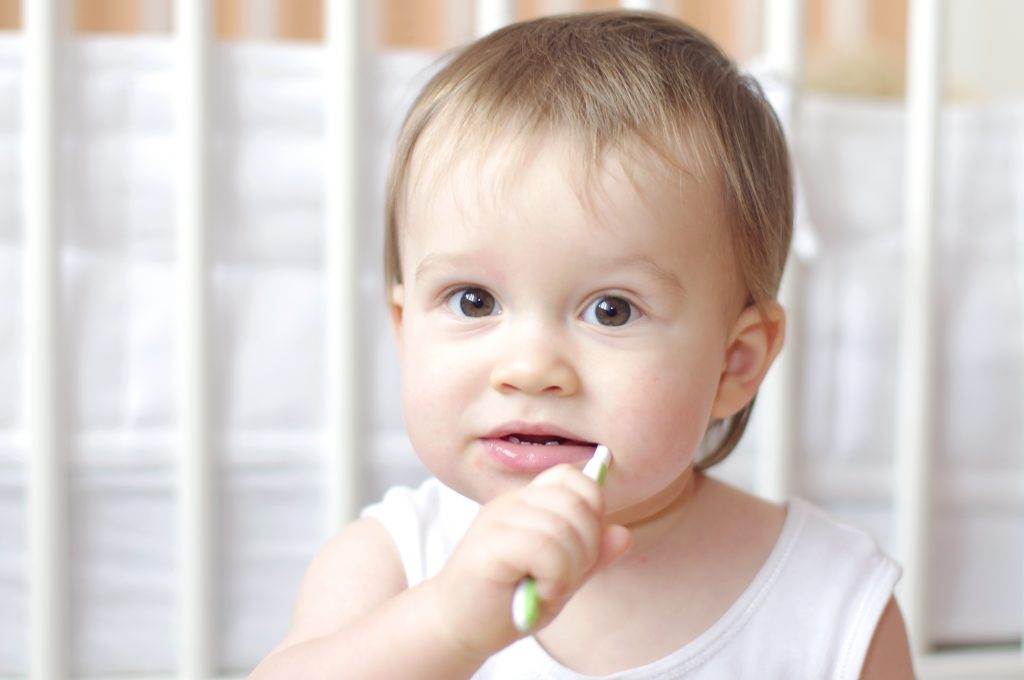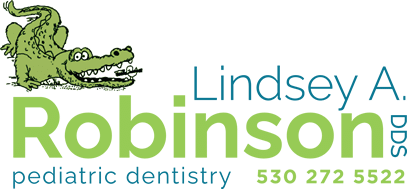Early Infant Oral Care
 Starting good habits and taking your child’s dental care into your hands is important to establishing lifelong dental health. Our team at Lindsey A. Robinson DDS Pediatric and Endodontic Dentistry in Grass Valley can help you start your child’s oral health off right. Proper nutrition, avoiding sugar, along with removing debris and plaque are all ways that we can help your child develop healthy teeth. Establishing goals, education and a care plan with Lindsey A. Robinson, DDS are the first steps in developing and maintaining healthy teeth.
Starting good habits and taking your child’s dental care into your hands is important to establishing lifelong dental health. Our team at Lindsey A. Robinson DDS Pediatric and Endodontic Dentistry in Grass Valley can help you start your child’s oral health off right. Proper nutrition, avoiding sugar, along with removing debris and plaque are all ways that we can help your child develop healthy teeth. Establishing goals, education and a care plan with Lindsey A. Robinson, DDS are the first steps in developing and maintaining healthy teeth.
Dental Care for Babies
Pediatric dental care begins before your baby’s teeth have even erupted. Parents have on occasion been surprised to see baby teeth come in already decayed. Though it’s not a common problem, it is something that can be easily avoided with proper education. Lindsey A. Robinson, DDS can give you the tools you need to protect your baby’s teeth before the teeth have even come in. For our youngest of patients, we will want to establish a few simple steps, such as good cleaning and diet habits.
• Habit: Establishing a daily habit of cleaning your child’s teeth, either with a washcloth or an infant toothbrush, will help them grow used to having their teeth cleaned and help you start a routine of daily considering cleaning their teeth.
• Comfort: We want your child to be comfortable with coming to the dentist office, sitting in the chair, and visiting with Lindsey A. Robinson, DDS. Though your child may not require a dental cleaning, we will want to develop a working relationship with your child and review tips, techniques, and guidance for you.
• No excessive sugar: Your young children have no need for excessive sugar. Parents often provide foods and drinks that are just unnecessary for their children. Eliminating juice is a simple step.
How old Should my Child be Before Going to the Dentist?
At Lindsey A. Robinson DDS Pediatric and Endodontic Dentistry, we know it’s important to develop a good working relationship with your child. We never want them to feel afraid of our tools, equipment, or staff. Their comfort is very important and studies show that being comfortable with your dentist in childhood promotes lifelong willingness to regularly see a dentist, meaning healthier teeth throughout their life. Having your child visit the dentist at a young age and with regular frequency is a great way to establish relationships and feel comfortable in a dentist chair. Lindsey A. Robinson, DDS wants to take the time to approach your child gently, show them the dental tools, and talk with the parent, and child, on the importance of proper oral hygiene. By bringing your child to their first pediatric dental visit at our Grass Valley office between the ages of 2 and 3, it can help us foster that relationship.
Oral Care Tips for Young Children
There are tips that parents can do that will assist your child in creating good oral health habits. Some of these tips include:
• Avoid sugary food items: At some point, apple juice became a regular child drink. We ask that you swap apple juice consumption with water. Do not put your babies or young children to bed with a sippy cup or bottle of juice. The sugar in juice promotes cavities, possibly even in teeth that do not erupt.
• Clean their gums or teeth: Either wipe their gums or lightly brush your child’s teeth every day. Parents should be in control of brushing until your child is at least 8 years old.
• Floss: By the time your child has a mouthful of teeth, they should begin flossing. Flossing is often difficult for children, flossing sticks have been found to be easier, though be aware of possible choking if used improperly. Flossing sticks while your child watches tv is a great way to get them to floss.
• Rinse: Mouth rinses aid in clearing away bacteria from your child’s mouth. This will need to be given to them with your presence and caution. There are child mouthwashes available that will not cause the same feeling of burning and some bottles are even designed to control the portion given.
When can my Child Start Brushing and Flossing?
You already know how important brushing and flossing are to your oral health. The American Dental Association recommends brushing at least twice daily and at least once daily. Just like you, your child needs proper oral care as well. The need for this care starts earlier than you might think. At Lindsey A. Robinson DDS Pediatric and Endodontic Dentistry, we can provide you with tips on proper brushing and flossing, aiding in setting your child up for a lifetime of good oral health care habits.
What age Should my Child Start Brushing?
Brushing habits start well before the baby teeth even emerge. Starting from just a few days after birth, you can use a damp washcloth to clean the gums gently. This can be done several times a day, after feeding and before bed, which will help to clear away bad bacteria. You can do this every day until the baby teeth begin to emerge.
Once the baby teeth start erupting, you can switch to an infant toothbrush, which has very soft bristles and a small head that is designed for tiny mouths. Use only a rice-sized amount of fluoride-free toothpaste. Just like you, your child should have their teeth brushed at least twice a day.
You will need to help your child brush their teeth, even brush their teeth for them, at least until the age of 3 or 4. After the age of 3, when your child can spit out toothpaste, you can switch to a fluoridated toothpaste. From the ages of 3 to 6, you should be using a pea-sized amount of toothpaste. Work with your child to hold the toothbrush properly, holding it at a 45-degree angle, and make sure that they can reach every area of their mouth. Continue to monitor closely, and assist, your child until the age of 5 or 6. After the age of 6, you can monitor from afar.
What age Should my Child Start Flossing?
Flossing should begin once the baby teeth begin to fit closely together. This usually occurs somewhere between the ages of 2 and 6. Work with your child to develop good flossing habits, and help them while they develop the dexterity necessary to manipulate floss. Typically, children can floss their teeth starting around the age of 10.
When teaching your child how to floss, you can either use regular floss, or you can use specialized floss picks. If you use regular floss, you can try tying loops at each end of the string so that your child can grip it in the early stages of learning. You can then demonstrate proper flossing technique and assist your child while they work with their teeth. There is also small floss picks specifically designed for small mouths. These small plastic tools can be easier for your child to handle and can make the task of flossing a lot simpler.
Schedule a Pediatric Appointment
Do you still have questions about caring for your child’s needs? Are you ready to schedule your child’s pediatric dental appointment? Starting oral care habits early is essential for setting your child up for a lifetime of good oral care habits and a healthy mouth, and we are happy to answer your questions or schedule your appointment. For more information or to schedule an appointment for your child, call Lindsey A. Robinson DDS Pediatric and Endodontic Dentistry today at (530) 272-5522.
